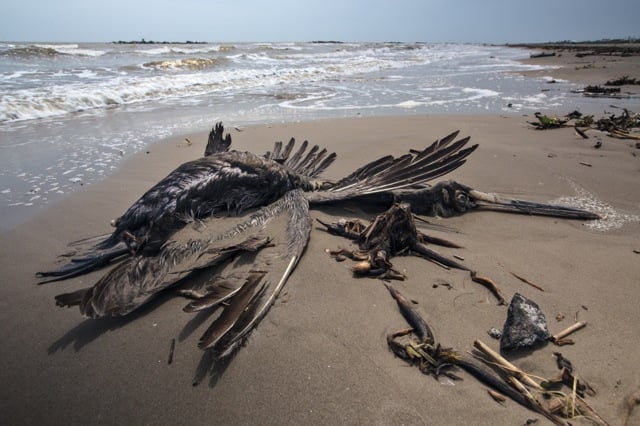
If you ask Dean Blanchard, the largest shrimp buyer and wholesaler in the region surrounding Grand Isle, Louisiana, things “went from paradise to hell” in the five years following the BP oil disaster.
But BP’s advertisements insist the company is making things right. A BP report on the State of the Gulf five years after the spill claims there is no lasting damage to the ecosystem.
Behind the industry public relations spin, many coastal residents, including Blanchard, have seen their livelihoods destroyed and their health comprised.
“Things continue to get worse,” Blanchard said.
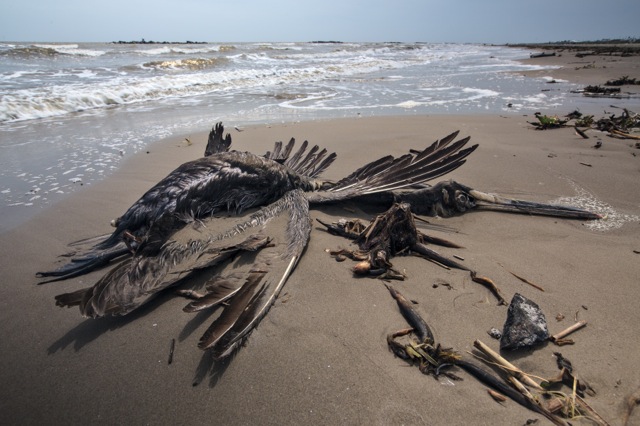 Dead pelican next to a tar ball on the beach on April 9, 2015 in Grand Isle, Louisiana. (Photo: Julie Dermansky)
Dead pelican next to a tar ball on the beach on April 9, 2015 in Grand Isle, Louisiana. (Photo: Julie Dermansky)
On April 9, tar balls were readily found every few feet along the beaches of Grand Island and nearby Elmer’s Island. Blanchard says there is a cleanup crew still around, but he never sees them picking anything up.
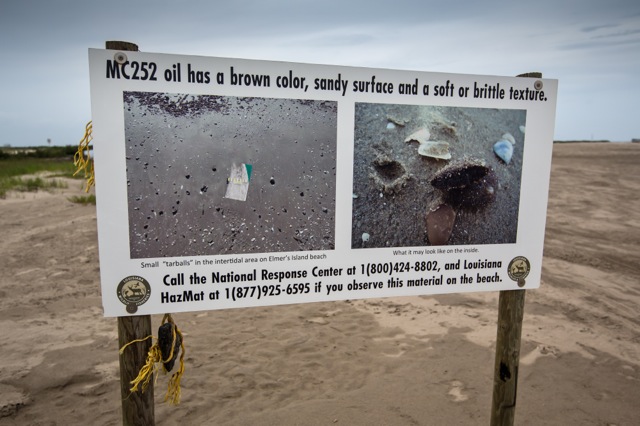 Tar ball warning sign on Elmer’s Island. (Photo: Julie Dermansky)
Tar ball warning sign on Elmer’s Island. (Photo: Julie Dermansky)
“Everyone knows that the claim BP has made the Gulf whole is just a bunch of bullshit,” Kindra Arnesen, resident of Venice, LA, told DeSmogBlog.
“If they had tried as hard to make the Gulf whole as they tried to spin the truth, maybe we would be on our way to recovery.”
Blanchard concurs, quipping that “BP stands for British Pinocchio.”
Blanchard and Arnesen have spoken out about the injustice they and their communities have faced since the early days of the largest oil spill in American history. Five years after the Deepwater Horizon platform blew up, taking the lives of 11 men and causing a yet to be determined amount of environmental damage, neither of them believes the region will ever be the same.
“I have been to a funeral now every month since July,” Arnesen told DeSmogBlog. “Everyone around me is sick.”
She is tired of her children suffering from rashes and headaches, and she wonders how much longer her husband, a fisherman who worked as an oil spill cleanup worker, can go on due to constant illnesses.
Friends who have left the area tell her their children’s health improved soon after. Arnesen wants to move her family away, but she can’t afford to. Her house has been on the market since 2012, and the bulk of her business claim against BP is held up in court, leaving her finances in shambles and the idea of relocating an impossible dream.
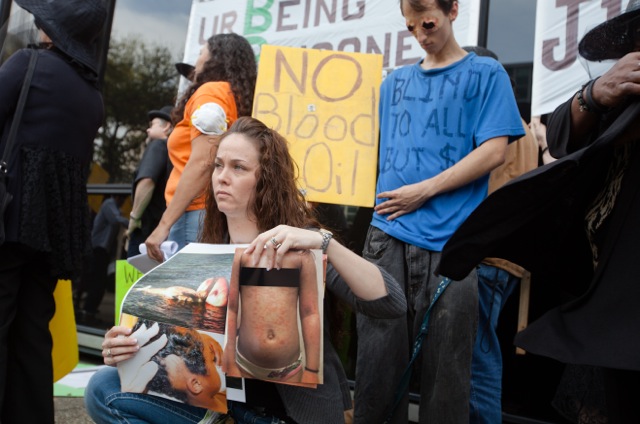 Kindra Arnesen holds up photographs of people and animals sickened since the BP oil spill during a protest in New Orleans on February 29, 2012. (Photo: Julie Dermansky)
Kindra Arnesen holds up photographs of people and animals sickened since the BP oil spill during a protest in New Orleans on February 29, 2012. (Photo: Julie Dermansky)
“Everyone around me is dying,” Blanchard said. “The Coast Guard can be bought off. It is a very sad situation. Everything you believe America to be, it is not.” Referring to Corexit, the dispersant that BP dumped on the spill, Blanchard added, “I thought I paid taxes for the government to protect me, not to try to kill me. I never thought they’d let them spray poison all over us.”
Blanchard’s sale of shrimp this year is down 75% and fish sales are off 90%. As for getting restitution for his business losses from BP, she isn’t optimistic.
“Five years after the spill and I still don’t have a court date,” he said. “There is no such thing as a speedy trial when you are fighting an oil company.”
Arnesen received some money from the BP claims process, but the bulk of her family’s business loss claim has been under investigation for the last year and a half. “How much time should it take to review 55 documents?” she asks.
Many think BP is delaying payment to try to wear people down or, in some cases, outlive them.
In March, on the day BP released its glowing report on the state of the Gulf, Blanchard’s brother Greg took a camera crew to East Grand Terre, a barrier island five miles off the coast of Grand Isle, where a BP cleanup crew was removing a large tar mat. Had Blanchard not spotted the cleanup effort the day before, news of the tar mat likely would have gone unreported.
WWL–TV’s cameraman filmed the cleanup effort. From the time the cleanup began until March 17, 2,200 pounds of weathered oil and sand were removed, according to the Coast Guard. He also filmed a mother dolphin pushing a dead calf around in Barataria Bay, in the waters off East Grand Terre.
The dolphin population in Barataria Bay was the focus of a peer-reviewed study that is part of the ongoing Deepwater Horizon Natural Resource Damage Assessment (NRDA). The study showed live dolphins in the bay had health problems consistent with exposure to petroleum products. The National Oceanic and Atmospheric Administration also reported that dolphins have experienced a greatly increased mortality rate along the Gulf Coast since the oil spill.
But BPissued a statement claiming the dolphin population was already experiencing a high mortality rate in the months before the spill, and there is no definitive proof the company is responsible for the higher rate, it claims.
BP Vice President Geoff Morrell shifted the blame for the tar mat. “At Grand Terre II [also known as East Grand Terre], the state continued with a beach replenishment program as oil came ashore in 2010, burying the oil under layers of sand,” Morrell stated.
It seems BP’s paid scientists and consultants find a way to deflect blame on everything connected to the spill, according to Kyle Graham, Louisiana’s Trustee for NRDA.
“They would like us to believe that it is purely coincidence that these mortality events have a higher occurrence in the areas that experience the highest level of oiling,” Graham told WWL News. “Independent scientists have taken a look at this and do believe the two are linked.”
On March 31, Restore the Mississippi River Delta Coalition, a coalition of environmental groups, took members of the media to the site where the tar mat cleanup took place on East Grand Terre. The group found another tar mat in the same location. BP cleanup workers either missed some of the tar mat found weeks before, or a new one had been uncovered.
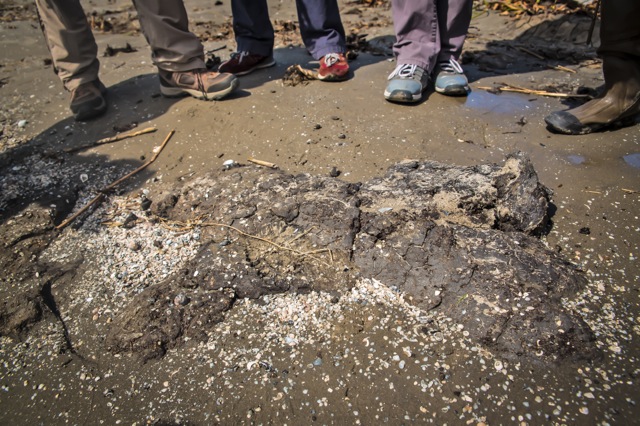 Tar mat on East Grande Terre Island, March 31, 2015. (Photo: Julie Dermansky)
Tar mat on East Grande Terre Island, March 31, 2015. (Photo: Julie Dermansky)
On April 9, Blanchard visited the same spot with DeSmogBlog and found the tar mat the coalition observed was still there.
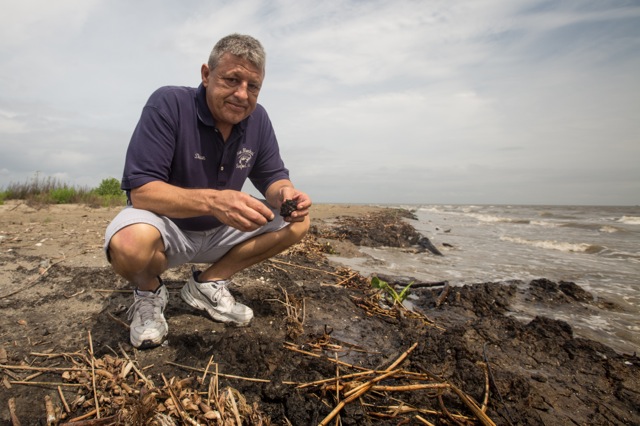 Dean Blanchard picks up a piece of tar from a tar mat on East Grand Terre Island in Barataria Bay on April 9, 2015. (Photo: Julie Dermansky)
Dean Blanchard picks up a piece of tar from a tar mat on East Grand Terre Island in Barataria Bay on April 9, 2015. (Photo: Julie Dermansky)
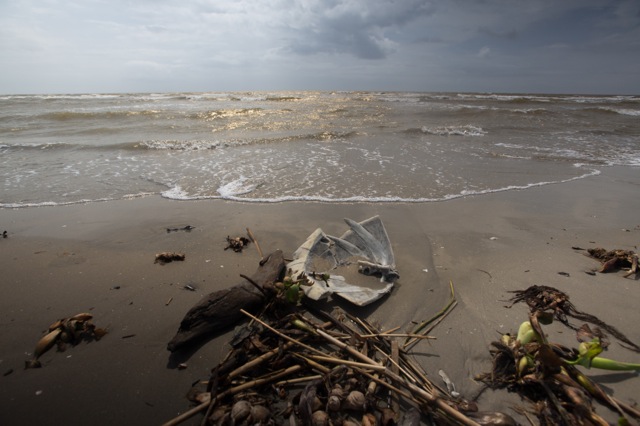 Piece of a sea turtle shell on East Grand Terre Island in Barataria Bay on April 9, 2015. (Photo: Julie Dermansky)
Piece of a sea turtle shell on East Grand Terre Island in Barataria Bay on April 9, 2015. (Photo: Julie Dermansky)
Scientists and NRDA commission trustees have said it is too soon to know the full extent of the damage caused by the spill. “It is inappropriate as well as premature for BP to reach conclusions about impacts from the spill before the completion of the assessment, ” the NRDA wrote in response to BP’s report.
“The oil is still there,” Linda Hooper Bui, an entomologist at Louisiana State University, told DeSmogBlog, and it is “being remobilized by storms.”
Previously un-oiled areas in the marsh along Barataria Bay became oiled after Hurricane Gustav in 2012. The remobilization of the oil tells her the oil spill is not an acute event – it is chronic – and just “how devastating this chronic event is, is yet to be determined.”
Bui was happy to report that beginning in November 2014, she found signs the ant population was rebounding. However, because the spill constitutes a chronic event, she said, “It is impossible to know if the ant population will continue to thrive.”
Bui is alarmed by conversations about how things might be handled if there is another spill. “There can’t be a next time,” Bui said. She doesn’t think the already stressed ecosystem could handle it. “In some places we might have dodged a bullet; in other places I’m not so sure.”
When it comes to continued oil drilling in the Gulf, according to Bui, “the safety mechanicals, whatever their cost might be, must be put in place.” But she doesn’t believe things are moving in that direction.
President Obama tabled a proposal to allow drilling in the Atlantic following the BP oil spill. Almost five years later, he put his proposal back on the table, despite the fact the government’s damage assessment from the BP spill has not been completed.
“The people pushing for drilling along the Atlantic are the ones who are getting money from BP,” Blanchard said. “Those East Coast congressmen and senators want the same millions the ones in Louisiana and Texas get.”
The use of Corexit taught Blanchard that BP never intended to do the right thing. According to Blanchard, the dispersant was used so BP wouldn’t have to pick up the oil. The reactive cleanup that did take place lined the pockets of the companies connected to the oil and gas industry that were tasked to handle it.
If BP wanted to do the right thing, Blanchard wonders, why hasn’t a single person from the company sat down and talked to him in his office. Never one to suppress the reality, he sums up his experience dealing with the aftermath of the spill: “The oil business is controlling the whole world.”
Join us in defending the truth before it’s too late
The future of independent journalism is uncertain, and the consequences of losing it are too grave to ignore. To ensure Truthout remains safe, strong, and free, we need to raise $43,000 in the next 6 days. Every dollar raised goes directly toward the costs of producing news you can trust.
Please give what you can — because by supporting us with a tax-deductible donation, you’re not just preserving a source of news, you’re helping to safeguard what’s left of our democracy.